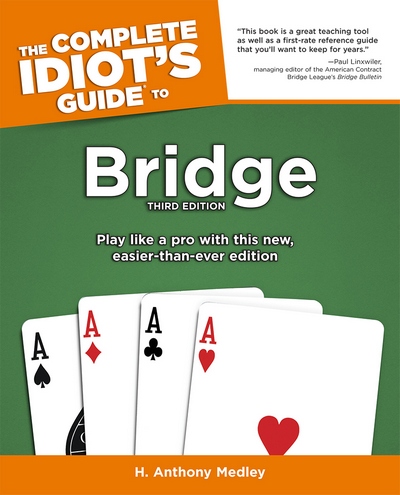| The first and second editions of Complete Idiot's Guide to Bridge by H. Anthony Medley comprised the fastest selling beginning bridge book, going through more than 10 printings. This updated Third Edition includes a detailed Guide to Bids and Responses, along with the most detailed, 12-page Glossary ever published, as well as examples to make learning the game even easier. Click book to order. Available in all bookstores and on Kindle. | ||
|
USE OF THE STOP CARD IN DUPLICATE BRIDGE by Tony Medley Is the use of the stop card mandatory or optional? This question is not covered in the “Laws of Duplicate Bridge.” The present way most directors in Los Angeles handle the use of the stop card is that it’s optional. They say that if you use it once, you must use it all the time. If you don’t use it, you can never use it. This defies logic. How do opponents know if you always use it or never use it? They don’t. There is no place on the convention card to indicate whether or not you use the stop card to make a skip bid, so opponents have no way of knowing whether or not you do use it or you don’t. And how does it protect opponents or yourself if you don’t use it? It doesn’t. Further, using the rule now enforced by the directors (that you either use it all the time or never) encourages abuse. Unethical pairs can have a private understanding that if they use the stop card for a skip bid it means one thing and if they don’t use it, it means something else. Since a pair will only play a few hands against each other pair, the possibility of getting caught is slim. If they get caught, they can just say they forgot. The directors don’t make its use mandatory because the only place the procedure is covered, found in ACBLSCOR under “Tournament Mode,” the wording is ambiguous, at best. In the tech files under bidding box, this is what it says:
So all the directors have interpreted this as being optional, since the word “should” is used. However, further on in the tech files, under POLTRN, Pg. 7 & 8, there is language that implies that the use of the stop card is mandatory. Here is what it says:
SKIP BID - WARNINGS 1. How and When Made Players should protect their rights and the opponent's (sic) by announcing, prior to making any subsequent bid that skips one or more levels of bidding. Proper procedure is: a. Place the stop card so that LHO sees it (the skip bidder is responsible for gaining LHO's attention). b. The skip bid is made. c. The stop card is replaced in the bidding box. 2. Skip Bidder The skip bid warning may not be used to alert partner that a strength-showing bid is being made or not being made. The warning should be used all the time. The tournament director may assess a procedural penalty (Law 90) for failure to comply. (emphasis added). … 6. Where Used The warning is effective for all ACBL sanctioned events. For sanctioned games at clubs, the club may elect to discourage it's (sic) use and require no mandated pause. (emphasis added). Once again, the word “should” is used (“The warning should be used all the time"). However, it does not say that it should be used either all the time or never, as directors do here in Los Angeles. There is no option. The statement states only that it should be used all the time. Additionally, the very next sentence reads, “The tournament director may assess a procedural penalty (Law 90) for failure to comply.” If the use is optional, why is the tournament director given the power to assess a penalty? If it’s not mandatory it would be unfair to assess a penalty. A fair reading of these two sentences is that the use of the stop card is mandatory, despite the use of the word “should.” Further, under #6 it is stated that “for sanctioned games at clubs, the club itself may elect to discourage it’s (sic) use and require no mandated pause.” This language is as ambiguous as the use of the word “should.” Are the words “it’s (sic) use” referring to the use of the stop card or the mandated pause? It seems to me that they refer to the use of the stop card. Otherwise the sentence would not then refer to the mandated pause, but this is terribly ambiguous and subject to interpretation. But if it takes an affirmative action to allow the stop card not to be used, a fair reading of this provision is that use of the stop card must be mandatory unless the club takes this action to “discourage” its use. Is the use of the stop card mandatory? Logic would indicate that it must be. However, the rules should be rewritten so that the intent of its use is clearly stated. My personal opinion is that it should be mandatory and if it is not mandatory it should be discarded. A good rule is clear and unambiguous. The word “should” is not appropriate in any rule or law as it implies discretion. There should be no discretion in a rule. Making the use of the stop card unambiguously mandatory could be achieved by simply replacing the word “should” where it appears several times with the word “shall.” Regardless, the rules should be written so that it is clear to everyone whether or not the use of a stop card when making a skip bid is mandatory. If it is not mandatory, there should be a specific statement that its use is optional. However, if it is optional, then an indication of whether or not a pair uses the stop card should be on the convention card.
|
||
